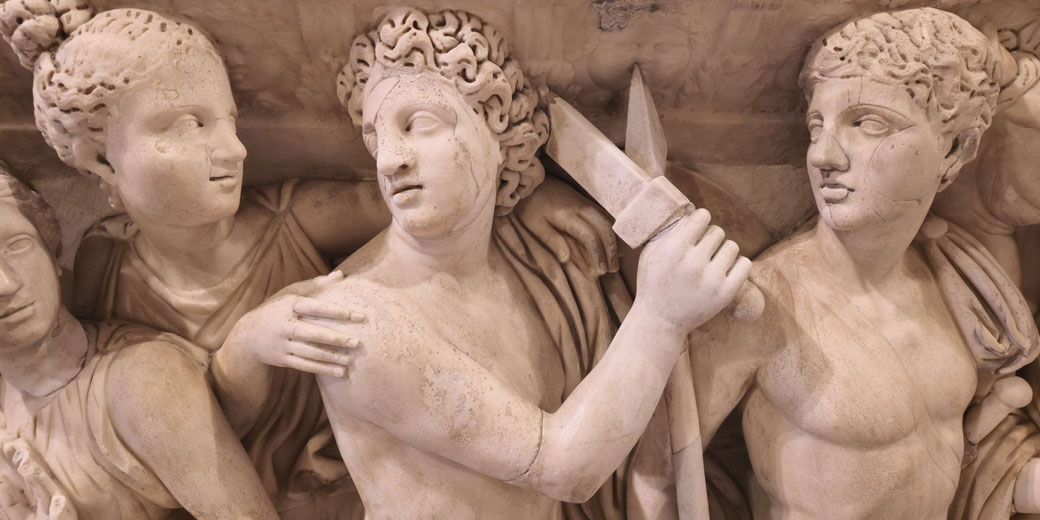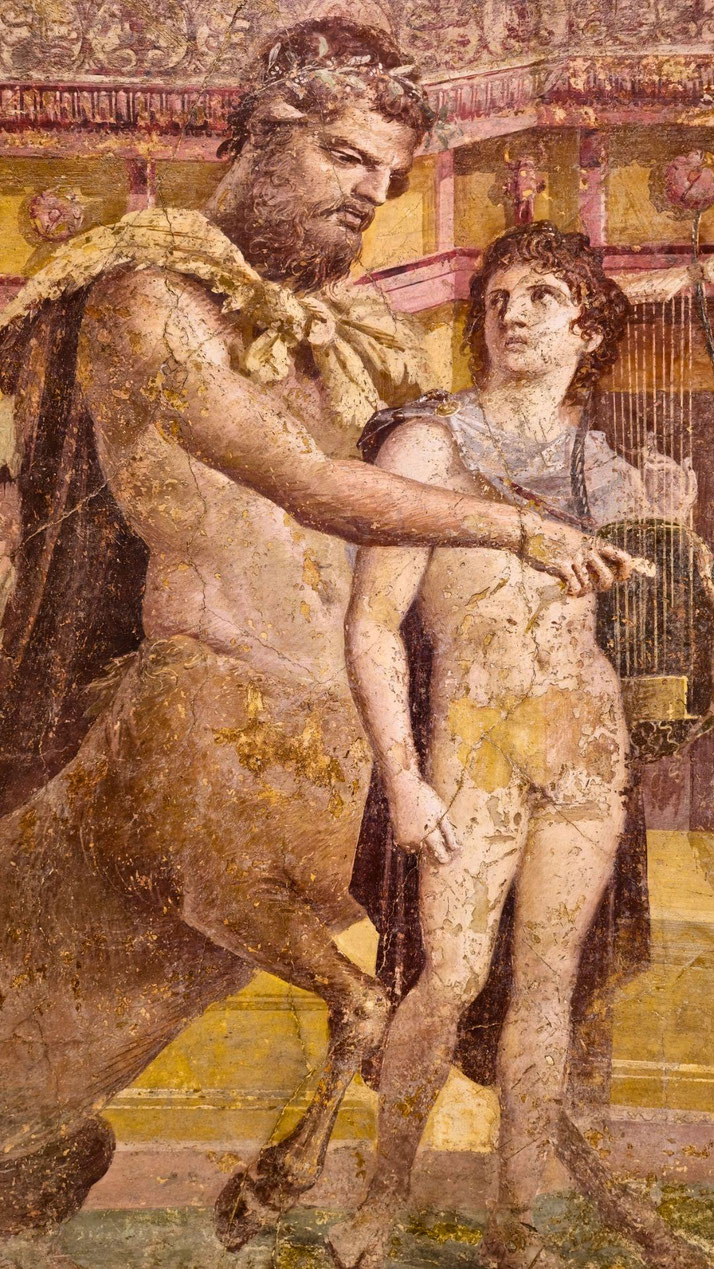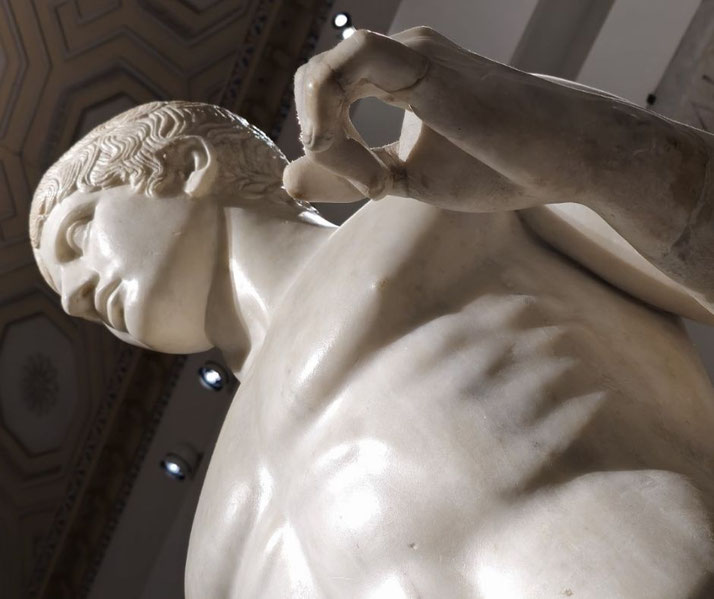Achilles: The hero, the legend, the tragedy

In Greek mythology, few figures command as much attention, respect, and intrigue as Achilles. Born of a mortal father and a divine mother, Achilles' life was an epic tale of superhuman feats, intense friendships, legendary battles, and a tragic death.
His story, immortalized in Homer's "Iliad," has been told and retold for thousands of years, shaping our understanding of heroism, honor, and the human condition.
But who was Achilles?
What drove this seemingly invincible warrior to the heights of glory and the depths of sorrow?
And how did his life, his relationships, and his death shape the course of the Trojan War?
Childhood
The story of Achilles begins even before his birth, with a prophecy that would shape his destiny.
The sea-nymph Thetis, his mother, was foretold to bear a son who would surpass his father in strength and valor.
This prophecy was so powerful that Zeus, the king of the gods, fearing that Thetis' son might overthrow him, arranged for her to marry a mortal, Peleus, the king of the Myrmidons.
Thetis and Peleus' union was celebrated with a grand wedding attended by all the gods, except for Eris, the goddess of discord.
Eris, in her anger at being excluded, threw a golden apple inscribed with the words "to the fairest" into the gathering, setting off a chain of events that would eventually lead to the Trojan War.
But that is a story for later. For now, our focus is on the child born of this union, Achilles.
Achilles' birth was marked by his mother's desperate attempt to protect him from his prophesied fate.
Thetis, in an effort to make her son immortal, held him by his heel and dipped him into the River Styx, the river of the underworld.
The Styx was said to confer invulnerability on anyone who bathed in its waters, and indeed, Achilles grew to be invulnerable everywhere except for the heel by which his mother held him.
This would later give rise to the term "Achilles' heel," symbolizing a single point of weakness.

Education and warrior training
Achilles' education and training played a significant role in shaping him into the formidable warrior he became.
His early years were spent under the guidance of the wise Centaur Chiron, who was known for his vast knowledge and wisdom.
Chiron was not just a mentor to Achilles; he was also a father figure, providing the young hero with the moral and intellectual grounding that would guide him throughout his life.
Chiron's education was comprehensive, encompassing both martial and peaceful arts.
Achilles learned to fight, to ride, and to hunt, skills that would later serve him well on the battlefield.
But Chiron also taught Achilles the art of music and the importance of wisdom and virtue.
Achilles became a skilled lyre player, and his love for music and song was a defining aspect of his character, setting him apart from other warriors of his time.
The training Achilles received was rigorous and demanding, designed to prepare him for the challenges he would face as a warrior.
He was taught to use a variety of weapons, and his natural strength and agility, combined with his invulnerability, made him an unparalleled fighter.
His martial prowess was such that he was said to be worth an entire army on the battlefield.
But Achilles' education was not just about physical strength and martial skills. Chiron also instilled in him a sense of honor and a deep understanding of the heroic code, principles that would guide his actions in the Trojan War.
He learned about the importance of glory and reputation, concepts that were central to the Greek heroic ideal.

Achilles and the Trojan War
The Trojan War, a decade-long conflict between the city of Troy and the combined forces of the Greek city-states, forms the backdrop for the most significant events in Achilles' life.
This war, sparked by the abduction of Helen, the wife of Menelaus, by Paris, the prince of Troy, brought together the greatest warriors of the age, with Achilles being the most formidable among them.
Achilles' involvement in the Trojan War was prophesied even before his birth. Despite his mother Thetis' attempts to hide him and keep him away from the war, Achilles was drawn into the conflict, driven by the promise of eternal glory.
He led the Myrmidons, a group of warriors from his father's kingdom, and his exploits on the battlefield became the stuff of legend.
One of the central themes of the Trojan War, as depicted in Homer's "Iliad," is the wrath of Achilles.
His quarrel with Agamemnon, the leader of the Greek forces, over the maiden Briseis led to Achilles withdrawing from the war, a decision that had disastrous consequences for the Greeks.
The "Iliad" begins with the line "Sing, O goddess, the anger of Achilles son of Peleus," highlighting the significance of Achilles' wrath in the narrative of the war.
Despite his initial withdrawal, Achilles was not to remain on the sidelines. The death of his close friend Patroclus, who was killed by Hector, the prince of Troy, while wearing Achilles' armor, brought Achilles back into the war.
Consumed by grief and rage, Achilles sought revenge, leading to the epic duel with Hector, which ended with Hector's death at Achilles' hands.
His greatest battles and exploits
Achilles' prowess on the battlefield is legendary, and his exploits during the Trojan War have been immortalized in the annals of Greek mythology.
His martial skills, combined with his invulnerability, made him a force to be reckoned with, a warrior whose presence could turn the tide of battle.
One of the most significant battles involving Achilles was the fight against the Trojan prince Hector.
This duel was not just a clash of arms; it was a confrontation between two of the greatest warriors of the age, each representing their respective sides in the Trojan War.
The battle was sparked by the death of Patroclus, Achilles' closest friend, at the hands of Hector.
Consumed by grief and rage, Achilles challenged Hector to single combat, a duel that ended with Hector's death.
This battle is one of the most dramatic and poignant moments in the "Iliad," showcasing Achilles' martial prowess and his deep emotional bonds.
Another notable exploit of Achilles was his fight against the Amazon queen Penthesilea.
The Amazons, a tribe of warrior women, had come to aid the Trojans, and in the ensuing battle, Achilles killed Penthesilea.
However, upon removing her helmet and seeing her face, Achilles was said to have fallen in love with her, a moment that adds a layer of tragedy and complexity to his character.
Achilles' battles were not just physical confrontations; they were also deeply emotional and psychological.
His actions on the battlefield were driven by a complex mix of motivations - honor, glory, revenge, and grief.
His victories brought him fame and respect, but they also brought him sorrow and loss.
His exploits, therefore, are a testament to his strength and skill as a warrior, but also to his humanity and his capacity for deep emotion.
Achilles and Patroclus
The relationship between Achilles and Patroclus is one of the most significant aspects of Achilles' story.
Their deep bond, characterized by mutual respect, affection, and shared values, is a central theme in the "Iliad," and their interactions provide a window into Achilles' character and motivations.
Patroclus, older than Achilles, was a close companion and confidant of the great warrior.
They grew up together, trained together, and when the call to war came, they fought side by side in the Trojan War.
Patroclus was not just a friend to Achilles; he was also a moral compass, often providing wise counsel and serving as a moderating influence on Achilles' fiery temperament.
Achilles' reaction to Patroclus' death also provides insight into the Greek concept of "philia," or deep friendship.
The Greeks valued friendship highly, considering it a bond as strong as, if not stronger than, familial ties.
Achilles' grief for Patroclus and his desire for vengeance reflect the intensity of their friendship and the high value placed on such relationships in Greek society.
How Achilles eventually died
The death of Achilles is one of the most famous episodes in Greek mythology, a tragic end to the life of a hero who was seemingly invincible.
Despite his many victories and his near invulnerability, Achilles was not immune to fate.
His death, as foretold by prophecy, came at the hands of Paris, the Trojan prince, with the assistance of the god Apollo.
The exact circumstances of Achilles' death are not detailed in the "Iliad," but are recounted in later works and myths.
According to the most common version, during a lull in the fighting, Paris, guided by Apollo, shot an arrow that struck Achilles in his heel, the only part of his body that was vulnerable.
This was the same heel by which his mother Thetis had held him when she dipped him in the River Styx in an attempt to make him immortal.
Achilles' death marked the end of the greatest warrior of the Trojan War, a loss that was deeply felt by the Greek forces.
His body was retrieved by his comrades and given a hero's funeral. His ashes were placed in a golden urn, which was then buried alongside those of his dear friend Patroclus.
The death of Achilles is a poignant reminder of the tragic nature of the Greek heroic ideal.
Despite his strength, courage, and martial prowess, Achilles could not escape his fate.
His death also underscores the concept of the "Achilles' heel," a term that has come to symbolize a single point of vulnerability in an otherwise strong or invincible person or system.
What do you need help with?
Download ready-to-use digital learning resources
Copyright © History Skills 2014-2025.
Contact via email
With the exception of links to external sites, some historical sources and extracts from specific publications, all content on this website is copyrighted by History Skills. This content may not be copied, republished or redistributed without written permission from the website creator. Please use the Contact page to obtain relevant permission.





